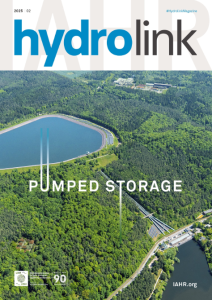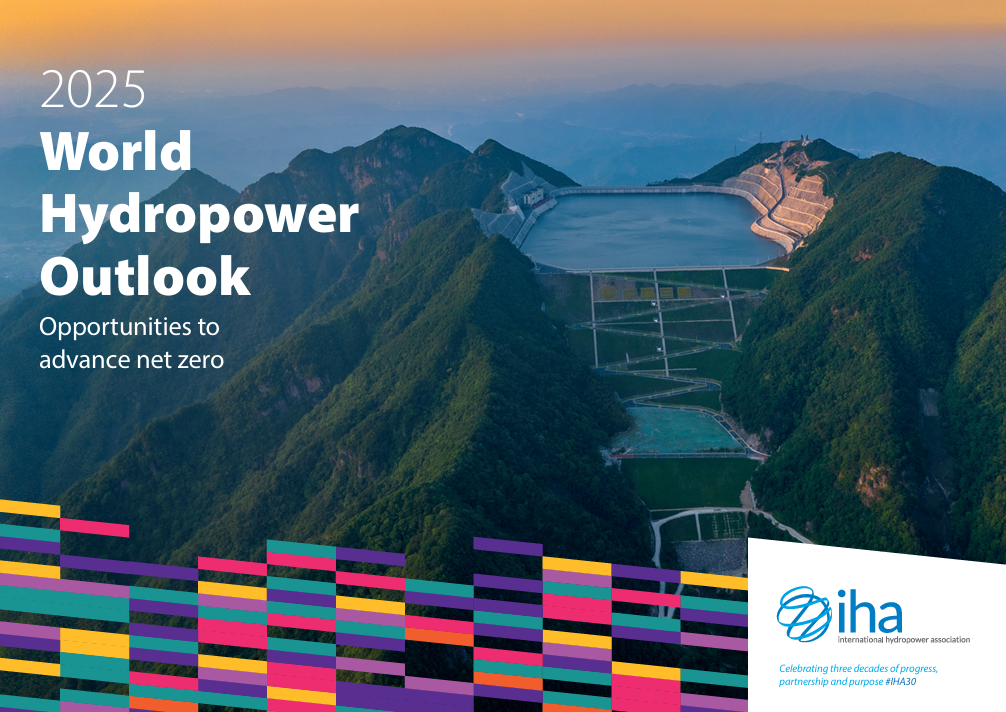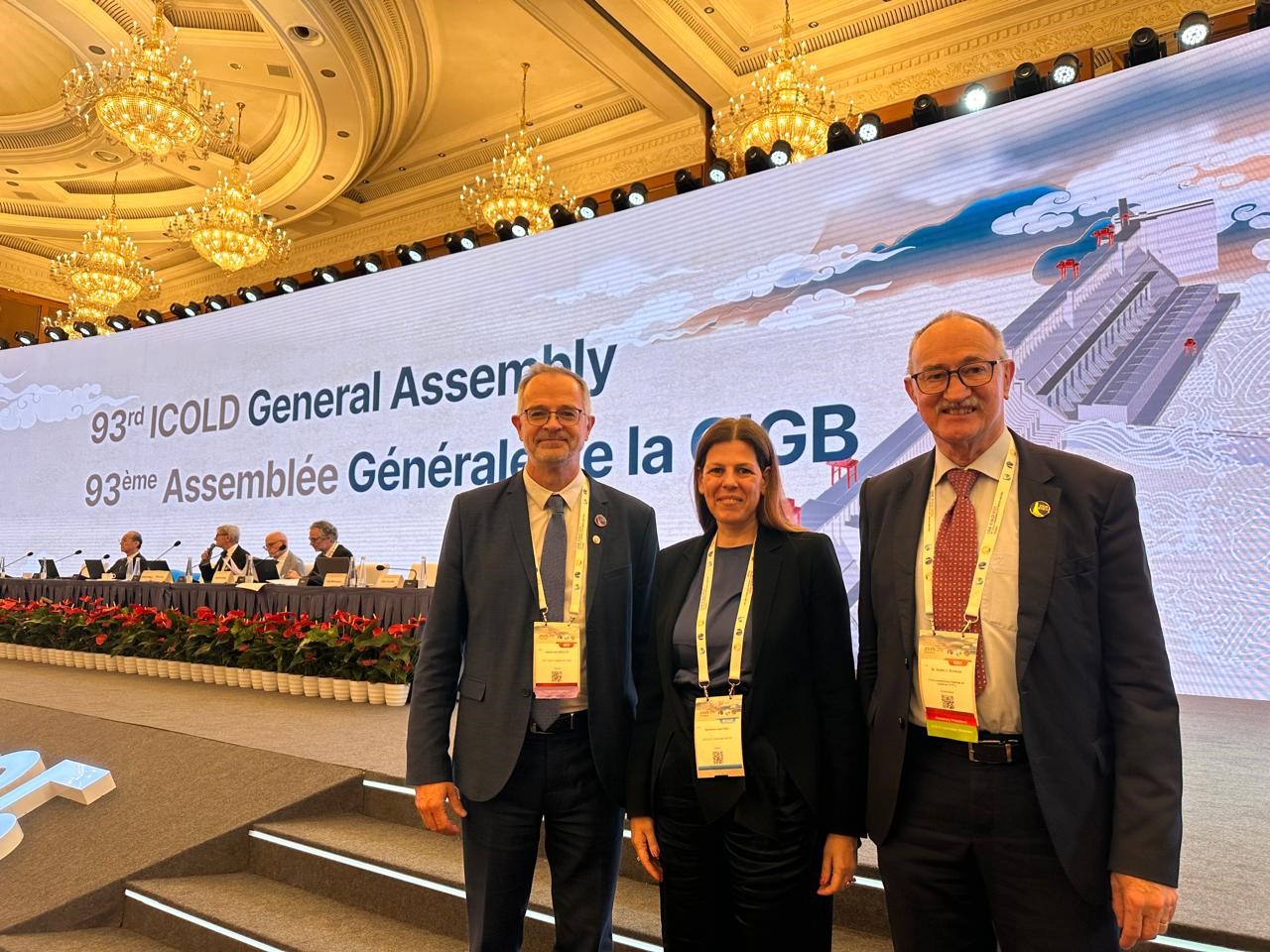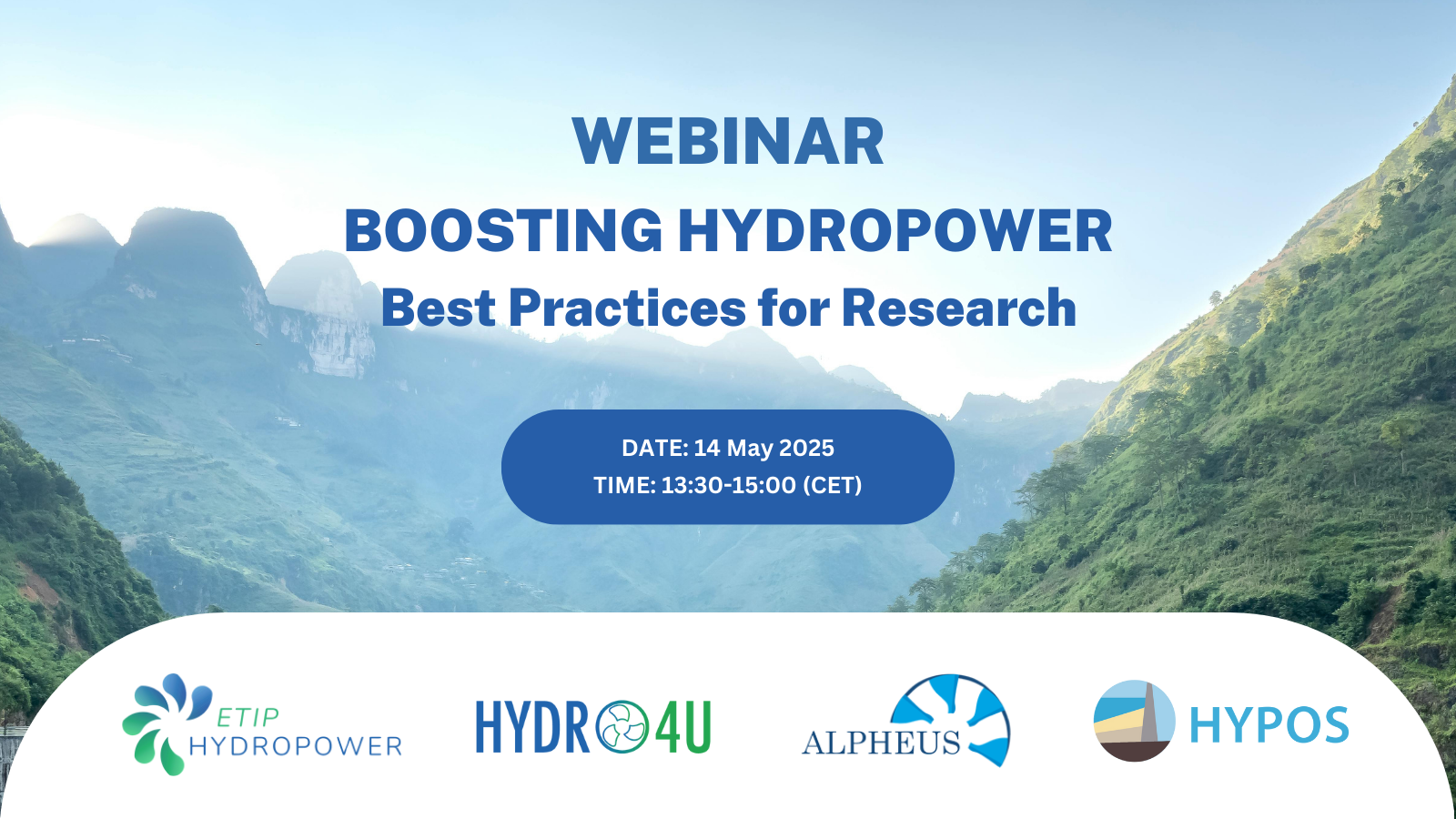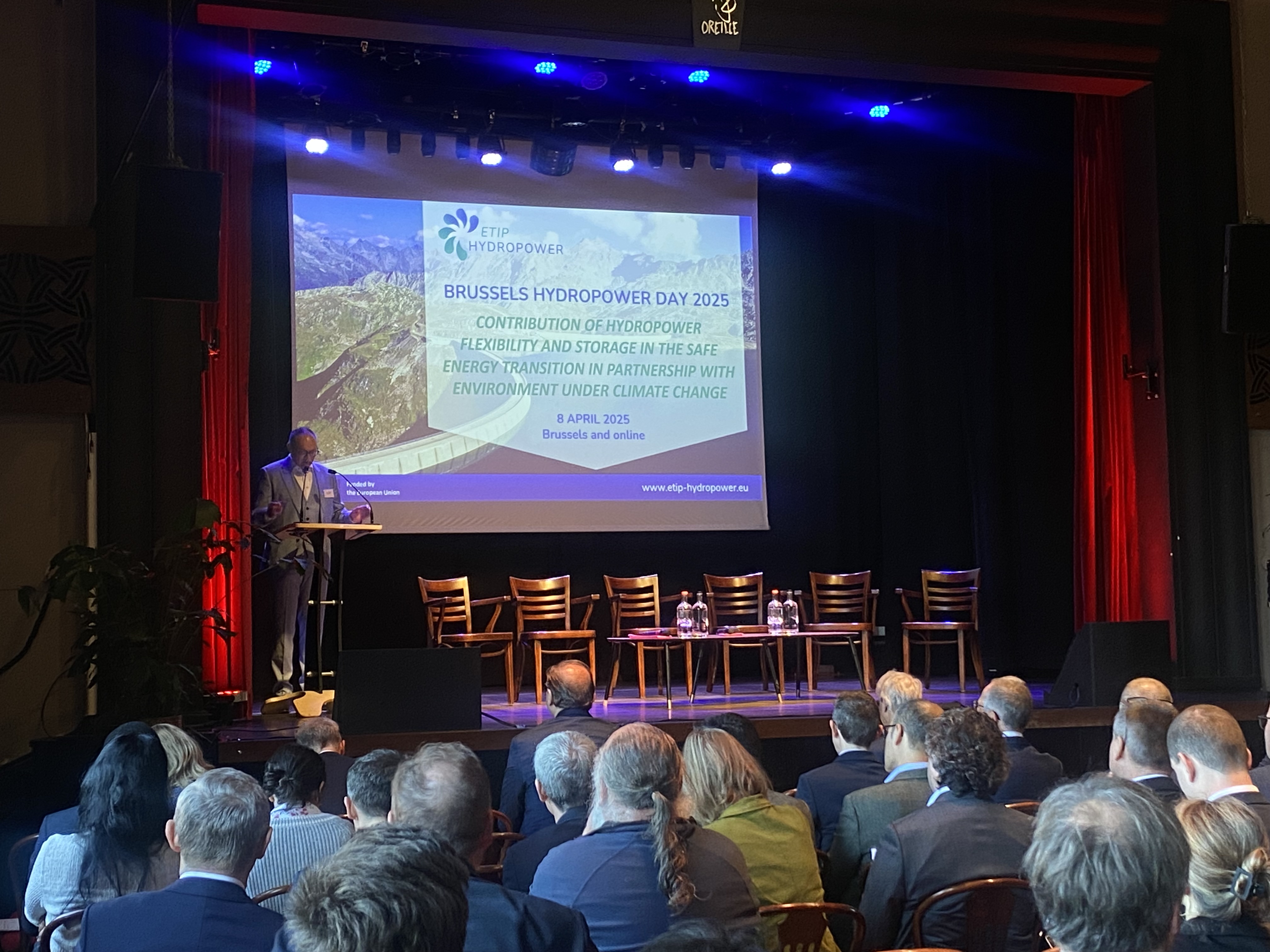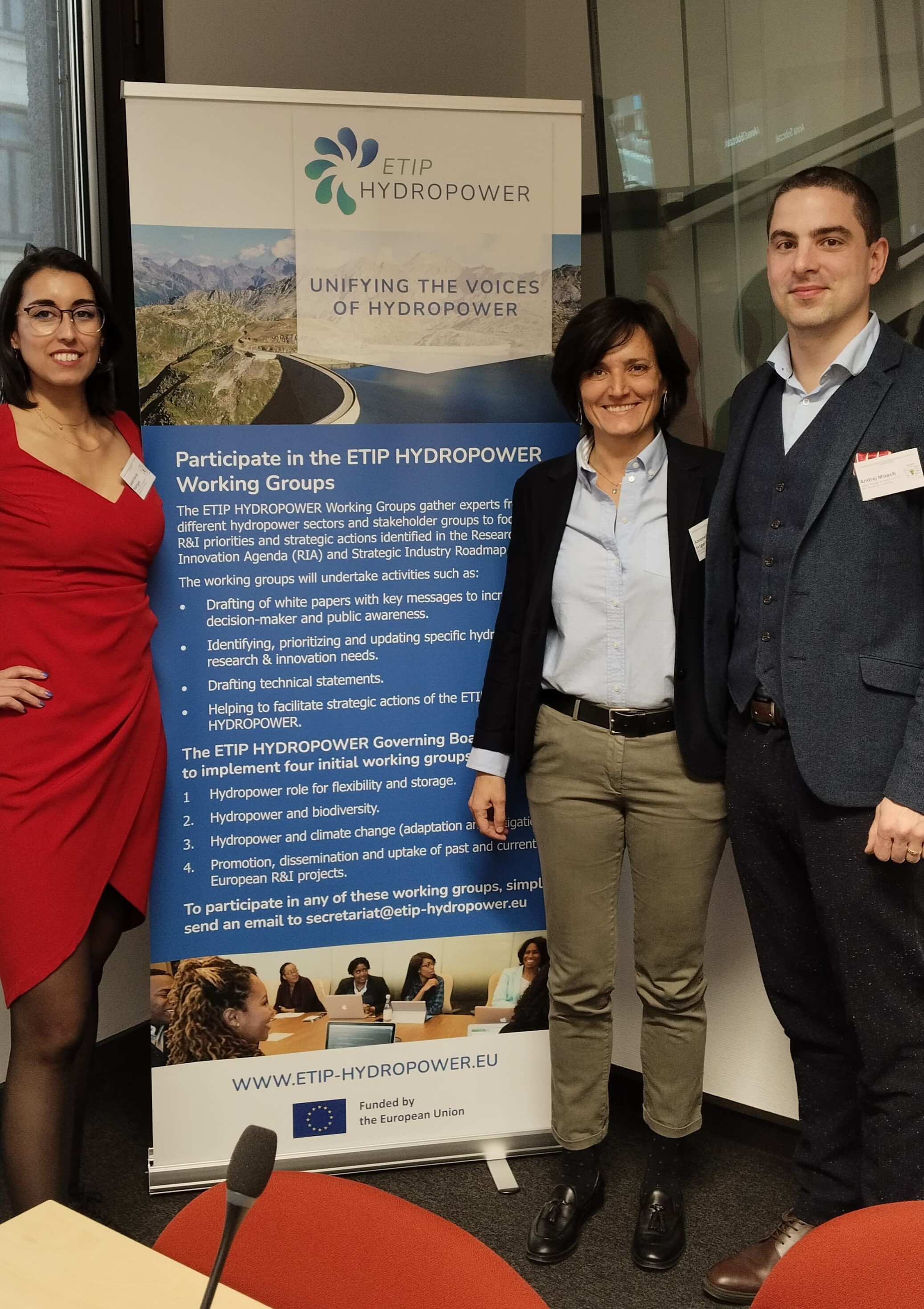UNIFYING THE VOICES OF HYDROPOWER
HYDROLINK 2/2025 Special Issue Released: Pumped Storage Hydropower at the Heart of Energy Transition
The latest special issue of HYDROLINK (2/2025), published by the International Association for Hydro-Environment Engineering and Research (IAHR), sheds light on the vital and evolving role of pumped storage hydropower (PSH) in global energy systems. Over the past fifty years, PSH has expanded significantly—initially serving as a solution to store surplus energy from thermal and nuclear plants during low-demand periods, and more recently, as a flexible backup to address the intermittency of wind and solar generation.
Several experts from the ETIP HYDROPOWER Forum contributed their insights and research to this special edition, emphasizing PSH’s critical role in supporting a secure and sustainable energy transition:
- Pumped Storage Hydropower in Arid Climates: A Crucial Asset for Energy Transition. Benoît Houdant and Thomas Pinchard (EDF) explore how PSH projects in water-scarce regions can enhance grid stability while contributing to renewable integration. Read more.
- Design Challenges in the Renaissance of Pumped-Storage Hydropower to Support the Energy Transition. Anton Schleiss (ETIP HYDROPOWER, EPFL) examines the engineering and environmental challenges driving modern PSH development. Read more.
- The Critical Role of Power Intake/Outlet Structures in Pumped Storage Schemes: Design Challenges and Optimization. Azin Amini and Giovanni De Cesare (EPFL) highlight the significance of hydraulic structures in optimizing PSH scheme efficiency and reliability. Read more.
- Pumped-Storage Technology: Fixed vs. Variable Speed. Michael Schmid (Andritz) analyzes the benefits and limitations of fixed and variable speed technologies in modern PSH plants. Read more.
This special issue underscores the strategic importance of pumped storage hydropower as a cornerstone technology for a decarbonized and resilient energy future. Access the full issue at HYDROLINK 2/2025.
Di-Hydro Project to Host First Workshop on Digital Innovation in HydropowerThe Di-Hydro Project is pleased to announce its First Project Workshop, an interactive online event dedicated to exploring how digital technologies can drive innovation within the hydropower sector. The workshop is designed to encourage knowledge-sharing and meaningful discussions on how digitalisation can support the development of hydropower both within the Di-Hydro Project and across the broader industry. As part of its commitment to advancing the potential of hydropower plants and clusters, the Di-Hydro Project seeks to transform the operation of hydropower facilities through the integration of digital technologies—making them more intelligent, efficient, and environmentally sustainable. Event Details:
Professionals, researchers and stakeholders with an interest in hydropower and digitalisation are warmly invited to attend. The workshop will provide a valuable opportunity to exchange insights, explore current trends, and discuss future applications of digital solutions in the hydropower sector. Registration is open until 24 July 2025 and can be completed via the following link: Register here.
|
2025 World Hydropower Outlook: Global Launch
Hydropower generation in Europe surged to its highest level in a decade in 2024, reaching 680 terawatt-hours (TWh), as the continent experienced exceptional rainfall and accelerated its transition toward renewables, according to the 2025 World Hydropower Outlook released yesterday by the International Hydropower Association (IHA). The report highlights a landmark year for Europe’s energy system, with hydropower, wind, and solar dominating the EU’s power mix. Hydropower alone generated 13% more electricity than the average output from 2014 to 2017. The increased output underscores hydropower’s critical stabilising role in a volatile energy landscape marked by shifting markets and growing security concerns. Total installed hydropower capacity in Europe rose to 262.7 gigawatts (GW) in 2024. The continent also saw growing interest in pumped storage hydropower (PSH)—the most proven large-scale electricity storage technology—as policy momentum builds. Europe’s PSH development pipeline now stands at 52.9GW, supported by EU-level reforms and national mechanisms designed to ensure long-term grid flexibility. The EU’s 2024 electricity market reform mandates member states to evaluate flexibility needs over five- to ten-year horizons, while national initiatives such as the UK’s Cap & Floor regime and capacity markets in Italy and Spain are drawing developers and investors alike. “With market volatility and system stress on the rise, pumped storage is gaining the attention it deserves,” said Eddie Rich, CEO of the IHA. “The story of this year’s Outlook is clearly that pumped storage hydropower is at the forefront as the world looks to expand energy storage.” IHA President Malcolm Turnbull added: “Encouragingly, this year’s World Hydropower Outlook shows that global new capacity is accelerating after several years of stagnation. Continued momentum will require bold policy action, including reforms to reward hydropower’s multiple benefits, and faster permitting. The only resource we lack is time.” On the ground, significant PSH activity is underway across Europe:
The total pumped storage installed capacity in Europe now stands at 56GW, with 201MW added in 2024. Globally, hydropower added 24.6GW of new capacity in 2024—including 16.2GW from conventional and 8.4GW from pumped storage. The development pipeline now exceeds 1,075GW, with 600GW of PSH and 475GW of conventional hydropower. As hydropower continues to anchor Europe’s renewable transition, the message from this year’s Outlook is clear: investment, policy, and urgency must align to ensure the region’s power systems remain reliable, flexible, and low-carbon. |
Hydropower Experts Convene in Gaustablikk for IEA HYDRO Task 9 MeetingExperts from across the hydropower sector gathered in Gaustablikk, Norway on May 21, 2025, for a full-day working meeting of IEA HYDRO Task 9. Hosted by Atle Harby and Linn Emelie Schäffer, the meeting brought together researchers and industry professionals to present their latest findings and strategize on the future direction of hydropower's role in energy systems—particularly in supporting flexibility, storage, and integration with other renewable technologies. Presentations Highlight Flexibility, Storage, and Economic ValuationThe meeting began with updates from Task 9 leads before moving into a series of technical presentations focused on surplus energy, flexibility metrics, and valuation methodologies:
Strategic Discussions on Ongoing and Future TasksIn the second half of the meeting, members provided updates on various sub-topics within Task 9: Status reports were shared on hydropower hybrids, flood control and drought management, and broader themes of flexibility and storage.
Looking Ahead: Focus Areas for Task 9Task 9 members agreed to prioritize several key areas moving forward:
For more information on the Task 9 and its work, check out their reports and website here. |
ETIP HYDROPOWER STAKEHOLDERS VISIT KÜHTAI 2 PUMPED STORAGE PLANT30 Energy Experts from 11 European Countries have Gathered to Visit One of Europe’s Most Advanced Pumped Storage Projects Under DevelopmentETIP HYDROPOWER—with the support of ANDRITZ and VOITH—organised an exclusive site visit to the Kühtai 2 Pumped Storage Power Plant, developed by TIWAG-Tiroler Wasserkraft AG (TIWAG), on 6 June 2025. The visit brought together 30 energy experts from 11 European countries, fostering dialogue and knowledge sharing across the hydropower sector. Hosted and guided by TIWAG, the visit offered participants direct insight into one of Europe’s most advanced pumped storage hydropower (PSH) projects currently under construction, along with the opportunity to engage with the engineers and specialists leading its development. Recharging Europe’s Energy SystemElectricity storage remains the essential pillar of the energy transition, enabling the integration of variable renewable energy sources, enhancing security of supply and reducing reliance on imported fossil fuels. In this context, Pumped Storage Hydropower has emerged as a proven, reliable, and large-scale storage solution and will play a key role in securing a sustainable and resilient European energy future. With several gigawatts of PSH under construction and tens of gigawatts in the pipeline across Europe, the region is experiencing a revival of investment and innovation in this field. Europe stands not only as a growing PSH market but also as a global hub for hydropower excellence. "Pumped storage hydropower is essential for grid stability, system flexibility, and the large-scale integration of renewables. Kühtai 2, developed by TIWAG, exemplifies how this proven technology can contribute to Europe’s clean and resilient energy future. As a key partner in this flagship project, Voith Hydro contributes with cutting-edge technology, deep expertise and long-standing commitment to collaboration across the industry.” — Radu Carja, Chief Sales Officer, Voith Hydro “Thank you to ETIP HYDROPOWER and TIWAG for the opportunity to gain such impressive insights into Europe’s largest dam construction sites. ANDRITZ is supplying two cutting-edge motor generators for this key plant, and ETIP HYDROPOWER is fulfilling its role as a European hub by offering stakeholders access to state-of-the-art technology and valuable exchange. This project is a crucial building block. Without hydropower and pumped storage, Europe’s energy transition cannot succeed. It’s not just about supply security, but also about using domestic resources, creating European added value, and strengthening know-how.” — Peter Stettner, ANDRITZ Hydro and Co-Chair of the ETIP HYDROPOWER Governing Board A Glimpse into the Kühtai 2 projectLocated in Tyrol, Austria, Kühtai 2 is being developed by TIWAG and is part of the expansion of the Sellrain-Silz power plant group. The plant is equipped with two variable-speed pump-turbine units of 95 MW each and full-size frequency converters, making it one of the most advanced flexible generation assets in Europe. The newly built Kühtai reservoir and the additional natural inflow from the Ötztal and Stubaital valleys will significantly enhance the plant's generation capabilities, allowing it to flexibly store and dispatch renewable electricity on demand. As Europe advances toward a more sustainable and resilient energy system, projects like Kühtai 2 underline the indispensable role of hydropower and the importance of cross-sector collaboration and stakeholder engagement. |
ETIP HYDROPOWER members participate in 28th ICOLD Congress and 93rd Annual Meeting in Chengdu, ChinaETIP HYDROPOWER members took part in the 28th Congress and 93rd Annual Meeting of the International Commission on Large Dams (ICOLD), held in Chengdu, China. The event brought together experts, policymakers, and institutional stakeholders from across the globe to discuss the role of dams and hydropower in addressing key global challenges, including energy transition and climate change adaptation. Denis Aelbrecht, Chair of the ETIP HYDROPOWER Governing Board; Sera Lazaridou, Member of the Governing Board; and Anton Schleiss, Secretariat and Scientific Coordinator, participated to the ICOLD General Assembly as Chairman of French National Committee, Chair of EURCOLD and Chair of ICOLD Technical Committee as well as Honorary ICOLD President to the 28th ICOLD Congress and 93the Annual Meeting in Chengdu, China. A significant outcome of the Congress was the endorsement of the World Declaration on “Dams and Reservoirs for Energy Transition and Adaptation to Climate Change.” The declaration was jointly signed by several leading international organizations, including ICOLD, the International Hydropower Association (IHA), IEA HYDRO, the International Commission on Irrigation and Drainage (ICID-CIID), the World Water Council, and IME. As part of the official programme, Anton Schleiss presented an overview of the recent progress and achievements of ETIP HYDROPOWER during the meetings of the EURCOLD Board and the ICOLD General Assembly. ETIP HYDROPOWER’s active participation at this high-level event underscores its ongoing commitment to unifying the hydropower sector and fostering the Research and Innovation Agenda. Read the full World Declaration here
|
WEBINAR: Boosting Hydropower V: Best Practices for Research with HYDRO4U, ALPHEUS and HYPOSOn 14 May 2025, from 13:30 to 15:00 CET, the latest session in the webinar series “Boosting Hydropower” will present three EU funded hydropower projects: HYDRO4U, ALPHEUS and HYPOS. Organised by the ETIP HYDROPOWER project, this session will present the outputs of three EU research projects on hydropower. Featured Projects and Presenters:
The webinar will also feature contributions from Anton Schleiss from the International Commission on Large Dams (ICOLD), who will be presenting ETIP HYDROPOWER and Emanuele Quaranta (European Commission Joint Research Center), who will delve into the recent policy programmes of interest to the hydropower sector, including the Water Resilience Strategy focusing on environmental aspects and the Net Zero Industry Act concerning manufacturing. This webinar will provide an opportunity to learn about the latest research developments in hydropower across Europe. How to Join: Further information regarding the privacy policy of the webinar can be found here
|
HYDROPOWER DAY 2025: How Hydropower is Powering the Energy TransitionKey insights from Hydropower Day 2025: Flexibility, innovation, and environmental stewardship driving Europe’s renewable energy future*Presentations available via ETIP HYDROPOWER CONSULTATION PLATFORM: https://hydro-consultation.eu/participant-area/ *
On 8 April 2025, leading experts, policymakers, and industry stakeholders gathered at Hydropower Day 2025 in Brussels to discuss the evolving role of hydropower in Europe’s energy transition. Hosted by ETIP HYDROPOWER, the event provided a platform for knowledge exchange, best practice sharing, and forward-looking discussions on sustainability, innovation, and climate resilience. With growing concerns over energy security, decarbonisation, and environmental sustainability, this event emphasised the essential role of hydropower in the clean energy future.
Europe needs a resilient energy system, and that means smart legislation, strong industrial strategy, and bold investment in hydropower R&I to stay ahead globallyThe keynote session emphasized hydropower’s ability to balance energy, water, food, and environmental needs. Thomas Schlecker (DG RTD) highlighted hydropower’s contributions to sustainability. In this session, the focus was on how European Hydropower could support the overall objectives set by Sustainable Development Goals (SDGs). Miroslav Marence (IHE) talked to us about the key role of energy in the European Policies and the status of the competitiveness in the hydropower sector. Next, Adel el Gammal (EERA) showcased the industry's strength in delivering green and flexible innovation globally and the role of EERA in R&I. The panel discussion was composed by Heike Bergmann (VOITH Hydro), Eivind Hodne Steen (Eurelectric); Miroslav Marence (IHE Delft) and Adel El Gammal (EERA) and moderated by Greg Arrowsmith (EUREC). The group discussed about the reasons why Pumped-Storage Hydropower (PSH) is not scaling as fast as it should be despite its critical role: PSH has the characteristics to be the key flexibility provider with the growth of wind and solar. However, the issue of the permitting process was also highlighted as one of the main blockers of this technology. Real-world hydropower projects show how we can meet demand, but financing and policy must catch upSession 1 was devoted to Strengthening Energy Security. Franck Dia Wagoum (ENTSO-E) stressed that flexibility is no longer optional in the European grid, emphasising hydropower’s role in ensuring stability both in long-term and short-term to manage variability. Michaël Plaschy (Nant de Drance, Alpiq) shared real-world experience operating a large, pumped storage plant under market constraints. He explained that financing and environmental concerns remain the major barriers for expansion. Finally, Atle Harby (SINTEF) presented research on the impact of large-scale hydropower in Norway on electricity prices and environmental conditions. He highlighted that interconnections among countries not only would lower energy prices but also promote energy solidarity in Europe. The panel discussion in the first session featured the previously mentioned speakers, with Wolfram Malzfeldt (BDW), Gordon Edge (IHA), and Elena Vagnoni (EPFL) joining them, while Leonardo Nibbi (Università degli Studi di Firenze) moderated the session. The panel discussion brought perspectives on hydropower’s role in enhancing flexibility and resilience within Europe’s energy system. Speakers highlighted the potential of run-of-river plants to support grid stability sharing practical examples from Switzerland and Norway, and stressed the importance of modernisation, fair compensation for flexibility services, and a balanced approach to environmental considerations. Technological advancements, such as those demonstrated in the XFLEX HYDRO project, and the use of AI for improved operations and monitoring, were agreed as key areas to support the future development of sustainable and efficient hydropower.
Balancing Energy Production and Environmental Preservation for Long-Term SustainabilityThe second session of the day revolved around environmental responsibility in hydropower. Tasniem Siegfried Jawaid (ETIP HYDROPOWER/EREF) told the audience about National interpretations of regulations on nature in the absence of an EU law on nature restoration. Christoph Hauer (BOKU) highlighted the importance of sediment management for both ecological and technical functions. He also explained that removing obstacle barriers does not solve the problem as it does not erase sediment dynamics but rather alters their pattern creating new concerns. Agnès Barillier (EDF), spoke about how hydropower’s environmental impact requires a context-specific approach that considers water flows, sediment continuity and fauna and flora behaviours (among other site-specific characteristics) to provide tailored measures that need to be monitored over time. Finally, Joao Costa (HSA) explained the audience how the Hydropower Sustainability Alliance offers a globally recognised certification system that enhances credibility, financial value and environmental accountability. The certification is done via independent auditing, thus ensuring stakeholder transparency and reliability. The panel discussion, moderated by Natalie Rojko (Energyminer), also included Jeffrey Tuhtan (TalTech), Ólafur Jónsson (Landsvirkjun), and the previously mentioned speakers. The panel debated about how important is that the ecosystem restoration efforts look beyond hydropower and consider the broader environmental context. As highlighted before, there is no one-size-fits-all approach and each water body must find site-specific solutions. In addition, they also underlined that long-term monitoring, and real-world experiences are vital to support the measures.
Climate resilience starts with smarter hydropower, tracking emissions and designing for extreme climate challengesThe third session focused on the work done by the Working Group 3 of ETIP HYDROPOWER, that is, the role of hydropower tackling climate challenges. Arianna Trevisiol (RSE Italy) highlighted how climate change will impact hydropower production in Europe, with northern regions potentially benefiting from increased water inflow, while southern areas, like Portugal and Italy, could see a 20-30% decrease in generation due to warmer temperatures and reduced rainfall. Next, Martin Fuchs (AFRY) emphasised that while hydropower plants contribute to emissions, they are vital for flood control, drought mitigation and providing low-carbon electricity. He also said that the sector needs to improve the climate resilience aspect of hydropower projects with proper adaptation and mitigation measures. The last presentation was done by Christos Dimou (PPC) who brought us the case of Greece’s reliance on large hydropower for energy generation. He stressed the increasing importance of PSH, the impact of droughts on energy prices and the need for new reservoirs, all with the focus on PSH as the future solution of these challenges. For the panel discussion of session three Aðalbjörg Birna Guttormsdóttir (DG ENV, EC) and Alessandra Carota (ENEL) joined the group of speakers. They discussed that the global push for greener hydropower is growing, with Europe leading the way setting standards. Hydropower plays a crucial role in the achievement of EU’s climate goals but needs to adapt to the rising climate risks. This could be addressed by smarter emissions tracking and improving efficiency though smarter technologies and modernising plants.
Conclusion and looking aheadHydropower must transform into a flexible and climate-resilient source of energy generation to meet the evolving needs of demand and climate change. With Europe leading on sustainability standards, hydropower places itself and an essential asset to achieving EU’s climate goads while tackling environmental concerns such as biodiversity loss and water ecosystem damage. As extreme weather patterns become more frequent, hydropower must bet on innovative solutions that prioritise both, sustainability and efficiency. Looking forward, the key lies in embedding flexibility into the hydropower systems. This would allow them to respond dynamically to changes in water flows. Collaboration and innovation were also highlighted as crucial in minimising environmental impact while boosting hydropower’s role in water resilience. The hydropower sector must unite with a clear and powerful voice driving flexibility, environmental protection and climate adaptation forward. To conclude the event, Anton Schleiss (ETIP HYDROPOWER / ICOLD) and Denis Aelbrecht (EDF/ ETIP HYDROPOWER GB) highlighted the importance of raising awareness and driving innovation in the sector. A key challenge is to strengthen ETIP HYDROPOWER’s role in unifying the voice of the hydropower community which requires the support from all stakeholders. Introduction of the Hydropower Day 2025 by Anton Schleiss (ETIP HYDROPOWER/ICOLD)
ABOUT ETIP HYDROPOWER: The ETIP HYDROPOWER project was shaped following the previous HYDROPOWER EUROPE Forum project which was funded by the European Union’s Horizon 2020 Research and Innovation programme that ran between 2018 and 2022. The hydropower Research and Innovation Agenda (RIA) and the Strategy Industry Roadmap (SIR) were created under the HYDROPOWER EUROPE project. The ETIP HYDROPOWER project is funded by the European Union under the Horizon Europe programme and the consortium comprises eight expert organisations including: EUREC, SAMUI FRANCE, EUROPEAN ASSOCIATION FOR STORAGE OF ENERGY (EASE), COMMISSION INTERNATIONALE DES GRANDS BARRAGES (ICOLD), VGB POWERTECH, ZABALA BRUSSELS, EUROPEAN RENEWABLE ENERGIES FEDERATION (EREF) and INTERNATIONAL HYDROPOWER ASSOCIATION (IHA). The project started in September 2022, is expected to end in August 2025 and has been granted EUR 1 million Euros under the call dedicated to “Support to the activities of the ETIPs and technology areas of the SET Plan”.
|
ETIP HYDROPOWER PARTICIPATES IN THE CONFERENCE ‘ADVANCING THE SET PLAN FOR A SUSTAINABLE ENERGY FUTURE’ HOSTED BY THE ETIPS FORUMETIP HYDROPOWER took part in the recent ‘Advancing the SET Plan for a Sustainable Energy Future’ conference on 19th March, represented by Antonella Frigerio, Co-Chair of the ETIP HYDROPOWER Governing Board and Vice Director at RSE. Antonella contributed to the session titled “Closing the Innovation Gap – Reviving the Virtuous Innovating Cycle”, where she provided insights on hydropower’s alignment with EU strategies, as well as sector challenges and future objectives. Hydropower and EU StrategiesAntonella emphasised that hydropower must adapt and innovate to actively contribute to the energy transition. ETIP HYDROPOWER is fully operational and has submitted an official request for recognition, awaiting a response. This recognition is critical as it allows updates to research priorities (RIA) and the industrial plan (SIR), ensuring hydropower remains at the forefront of sustainable energy developments. Key aspects of hydropower include energy security, its position as the leading renewable energy source in terms of production, and its contributions to mitigating flood risks and reducing drought impacts on agriculture. These services are often assumed but may become increasingly relevant in addressing future energy and climate-related challenges. ETIP HYDROPOWER is open to collaboration with other ETIPs and the Energy Alliance to strengthen the sector’s presence and integration within EU policies. Challenges and Future ObjectivesSeveral key challenges affecting the hydropower sector were identified:
Future Outlook and Policy ConsiderationsIn a scenario with fewer regulatory constraints, ETIP HYDROPOWER’s priorities would include securing official recognition from the European Commission and fostering EU-level discussions with environmental stakeholders. Establishing structured dialogue could contribute to a more balanced approach to hydropower’s role in sustainable energy policies. We remain engaged in innovation, regulatory discussions, and cross-sector collaboration to support hydropower’s role within Europe’s evolving energy landscape.
|
WEBINAR RECAP: Boosting Hydropower IV: Beyond the ProjectOn 26 February 2025, the fourth session of the webinar series “Boosting Hydropower” brought together experts and researchers to share recent developments in hydropower technology. Organised by the ETIP HYDROPOWER project, the event highlighted key innovations and introduced findings from the recently finalised hydropower projects funded by the EU. The three European-funded research projects—Fish-friendly Innovative Technologies for Hydropower (FIThydro), Hydropower Extending Power System Flexibility (XFLEX HYDRO), and Hydropower solutions for developing and emerging countries (HYPOSO)—were showcased. Project highlights were:
In addition, Anton Schleiss from the International Commission on Large Dams (ICOLD), also provided an overview of ETIP HYDROPOWER’s contributions to innovation and policy support in the sector and outlined the next BRUSSELS HYDROPOWER DAY 2025. ACCESS THE PRESENTATION HERE and REGISTER FOR THE HYDROPOWER DAY. The session reinforced the importance of research and innovation in ensuring the continued relevance of hydropower within Europe’s energy landscape. The projects presented demonstrated how modernisation, environmental responsibility, and resilience are integral to the future of the sector. The webinar series remains a valuable platform for knowledge exchange and collaboration, supporting hydropower’s contribution to achieving the EU’s clean energy objectives. You can rewatch it on our Youtube channel or via the miniature below: |

